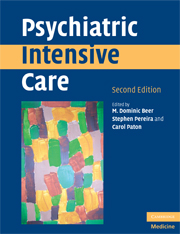Book contents
- Frontmatter
- Contents
- List of contributors
- Preface to second edition
- Preface to first edition
- Foreword
- Part I Therapeutic interventions
- Part II Interface issues
- 13 The provision of intensive care in forensic psychiatry
- 14 The interface with forensic services
- 15 Supporting people with learning disabilities on general psychiatric wards, PICUs and LSUs
- 16 The interface with general psychiatric services
- 17 The interface with the Child and Adolescent Mental Health Services (CAMHS)
- 18 Severe mental illness and substance abuse
- 19 Social work issues in PICUs and LSUs
- 20 User and carer involvement
- Part III Management of the Psychiatric Intensive Care Unit/Low Secure Unit
- Index
- References
15 - Supporting people with learning disabilities on general psychiatric wards, PICUs and LSUs
from Part II - Interface issues
Published online by Cambridge University Press: 22 August 2009
- Frontmatter
- Contents
- List of contributors
- Preface to second edition
- Preface to first edition
- Foreword
- Part I Therapeutic interventions
- Part II Interface issues
- 13 The provision of intensive care in forensic psychiatry
- 14 The interface with forensic services
- 15 Supporting people with learning disabilities on general psychiatric wards, PICUs and LSUs
- 16 The interface with general psychiatric services
- 17 The interface with the Child and Adolescent Mental Health Services (CAMHS)
- 18 Severe mental illness and substance abuse
- 19 Social work issues in PICUs and LSUs
- 20 User and carer involvement
- Part III Management of the Psychiatric Intensive Care Unit/Low Secure Unit
- Index
- References
Summary
Introduction
The syndrome of cognitive and social impairments known as ‘learning disability’ (LD) is an important vulnerability factor for developing serious psychiatric disorders. When people with LD need acute psychiatric admission this is frequently to general psychiatric wards where they are often under the care of general adult psychiatrists and mental health nurses who often have little knowledge or training in looking after psychiatric disturbance in this group. Common mental illnesses may have unfamiliar presentations, there may be idiosyncratic responses to treatment and it may not even be clear how conventional treatments should be applied. The psychiatric care of people with LD can become further complicated by boundary disputes between general adult and LD services, who frequently misunderstand one another's roles, expertise and resources.
This chapter will look at some of the principal challenges that generic mental health professionals (including psychiatrists, nurses and psychologists) face in looking after people with LD as inpatients, whether that is on the acute ward or, occasionally, in highly specialised settings such as the Psychiatric Intensive Care Unit (PICU). It is not an exhaustive account of the specialist psychiatric aspects of LD but highlights recurrent themes that concern general mental health professionals and for which advice is most often sought. The chapter is written mainly with patients with so-called mild LD (the group with which general psychiatric services most often come into contact) in mind.
Defining learning disability
ICD-10 continues to refer to LD by the now archaic term of ‘mental retardation’.
- Type
- Chapter
- Information
- Psychiatric Intensive Care , pp. 202 - 219Publisher: Cambridge University PressPrint publication year: 2008



